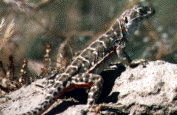Gambelia sila
From Wikipedia, the free encyclopedia
[Photo] Gambelia silus - blunt-nosed leopard lizard. Photo credit: Joseph D. Engler, USFWS. License: public domain
Gambelia sila, also known as the Blunt-nosed leopard lizard is a federally listed endangered species as a result of habitat destruction by man.
The blunt-nosed leopard lizard (Gambelia silus) is a relatively large lizard of the Crotaphytidae family. It has a long, regenerative tail, long, powerful hind limbs, and a short, blunt snout. Adult males are slightly larger than females, ranging in size from 3.4 to 4.7 inches in length, excluding tail. Females are 3.4 to 4.4 inches long. Males weigh 1.3 to 1.5 ounces, females 0.8 to 1.2.
Blunt-nosed leopard lizards feed primarily on insects (particularly grasshoppers, crickets and moths), other lizards and occasionally plant material.
Although blunt-nosed leopard lizards are darker than other leopard lizards, they exhibit tremendous variation in color and pattern on their backs. Their background color ranges from yellowish or light gray-brown to dark brown, depending on the surrounding soil color and vegetation. Their undersides are uniformly white. They have rows of dark spots across their backs, alternating with white, cream-colored or yellow bands.
Males are highly combative in establishing and maintaining territories. Male and female home ranges often overlap. The mean home range size varies from 0.25 to 2.7 acres for females and 0.52 to 4.2 acres for males. Density estimates range from 0.1 to 4.2 lizards per acre. Population densities in marginal habitat generally do not exceed 0.2 blunt-nosed leopard lizards per acre. There are no current overall population size estimates for the species.
Breeding activity begins within a month of emergence from dormancy and lasts from the end of April to the end of June. Male territories may overlap those of several females, and a given male may mate with several females. Two to six eggs are laid in June and July, and their numbers are correlated with the size of the female. Under adverse conditions, egg-laying may be delayed one or two months, or reproduction may not occur at all.
Females typically produce only one clutch of eggs per year. But some may produce three or more under favorable environmental conditions. After about two months of incubation, young hatch from late July through early August, rarely to September.
Seasonal above ground activity is correlated with weather conditions, primarily temperature. Lizards are most active on the surface when air temperatures are between 74° and 104° F, with surface soil temperatures between 72° and 97°. Smaller lizards and young have a wider activity range than the adults.
Leopard lizards use small rodent burrows for shelter from predators and temperature extremes. Burrows are usually abandoned ground squirrel tunnels, or occupied or abandoned kangaroo rat tunnels. Each lizard uses several burrows without preference, but will avoid those occupied by predators or other leopard lizards. In areas of low mammal burrow density, lizards will construct shallow, simple tunnels in earth berms or under rocks.
Potential predators are numerous. They include snakes, predatory birds and most carnivorous valley mammals. Blunt-nosed leopard lizards themselves feed primarily on insects (mostly grasshoppers, crickets and moths) and other lizards.
http://en.wikipedia.org/wiki/Gambelia_sila
| The text in this page is based on the copyrighted Wikipedia article shown in above URL. It is used under the GNU Free Documentation License. You may redistribute it, verbatim or modified, providing that you comply with the terms of the GFDL. |
|

